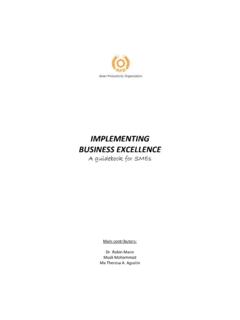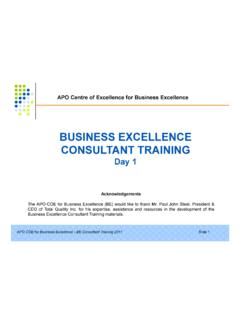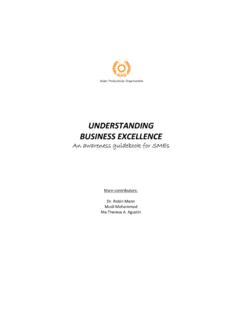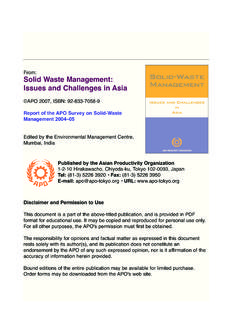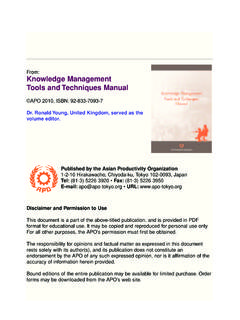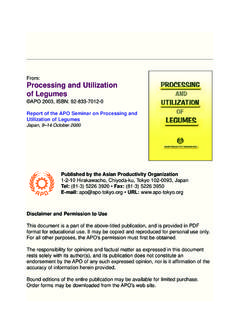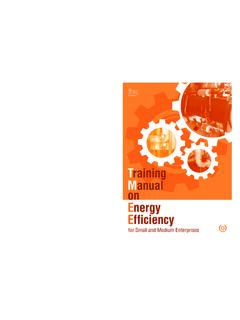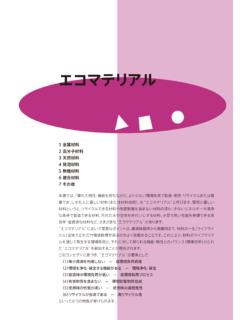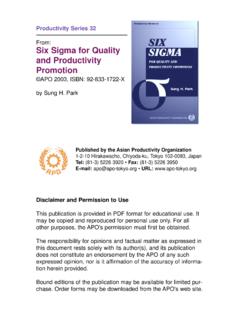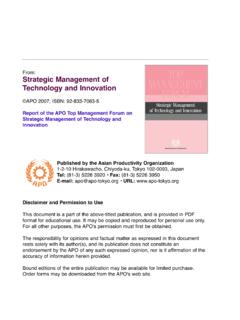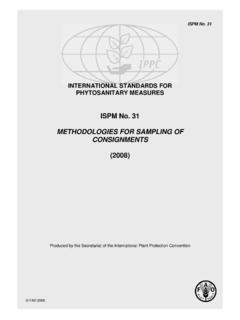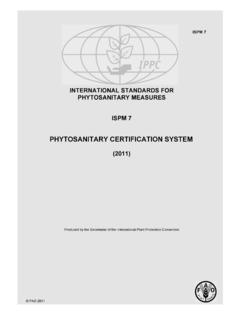Transcription of SANITARY AND PHYTOSANITARY MEASURES - APO
1 SANITARY ANDPHYTOSANITARY MEASURESR eport of the APO Seminar on SANITARY and PHYTOSANITARY MEASURES held in Japan, 4-11 December 2002 (02-AG-GE-SEM-09)This report was edited by Mr. Cornelis Sonneveld, Managing Director, Alesun Food Technology, opinions expressed in this publication do not reflect the official view of the Asian ProductivityOrganization. For reproduction of the contents in part or in full, the APO s prior permission is required. Asian Productivity Organization, 2005*Cambodia joined the APO in ISeminar 1 Part IIResource Papers1. SANITARY and PHYTOSANITARY (SPS) Agreement: Overview andRecent Codex standards and Food Bovine Spongiform Encephalopathy (BSE) Outbreaks andCommutable Disease Control MEASURES in MEASURES for Enhancement of Food Safety and Quality AssuranceSystems for Enhanced Rights and Obligations under the SPS Agreement: Responses ofGovernment, Japan s Enhancement of PHYTOSANITARY MEASURES for Trading of Plantsand Plant III Country Reports1.
2 Zahangir Republic of China (1)..Woan-Ru Republic of China (2)..Yueh-Jong T. India (1)..Aparna India (2)..Prem Narain1047. Islamic Republic of Dastmalchi1108. Sivapragasam, Booty Othman Asna and Add. Talib Shamsinar1149. Orgil, S. Burenjargal, S. Lkhagvasuren and N. Batsuun12210. C. T. D. Shrestha12611. Sher Muhammad13512. R. Lacson14313. Lay Har14714. Oyviratana15215. Thuy Hai15716. Cambodia*..Khlauk Chuon16217. Union of Aye16818. Papua New Puana175 Part IVAppendices1. List of Participants, Resource Speakers, and Secretariat .. 1802. Program of 185*It was reconstituted to the Japan Association for international Collaboration of Agriculture and Forestry(JAICAF) in 1 -SEMINAR HIGHLIGHTSINTRODUCTIONThe Seminar on SANITARY and PHYTOSANITARY MEASURES which was organized by the Asian ProductivityOrganization (APO) and hosted by the Government of Japan was held in Tokyo from 4 to 11 December Association for international Cooperation of Agriculture and Forestry (AICAF)* implemented theprogram in cooperation with the Ministry of Agriculture, Forestry and Fisheries (MAFF).
3 Eighteenparticipants from 14 member countries and three non-member countries, and six overseas and local resourcesspeakers, attended the objectives of the Seminar were to:*review recent developments in the application of SANITARY and PHYTOSANITARY (SPS) MEASURES in Asia andPacific countries;*identify major problems and issues relating to the implementation of such MEASURES ;*suggest ways/means of resolving them to ensure better food safety/security; and*facilitate world trade in food and agricultural Seminar consisted of the presentation and discussion of resource papers and country papers, as wellas the conduct of a workshop and field studies in Kanagawa prefecture. The topics covered by the resourcepapers and PHYTOSANITARY (SPS) Agreement: Overview and Recent Developments; standards and Food Safety; Spongiform Encephalopathy (BSE) Outbreaks and Commutable Disease Control MEASURES inJapan; for Enhancement of Food Safety and Quality Assurance Systems for Enhanced Trade; and Obligations under the SPS Agreement: Responses of Governments, Japan s Case; of PHYTOSANITARY MEASURES for Trading of Plants and Plant country papers, on the other hand, focused on the current situation concerning the implementationof SPS MEASURES , main issues regarding the application of such MEASURES in the respective participatingcountries.
4 The field studies comprised visits to the Plant Protection Station and Animal Quarantine Serviceunder the MAFF, both located in Yokohama, and the Kanakei Sangyo Co. in Ayase highlights of the Seminar are presented PAPERSS anitary and PHYTOSANITARY (SPS) Agreement: Overview and Recent Developments(Dr. Kazuaki Miyagishima)The Uruguay Round of Multilateral Trade Negotiations was concluded in Marrakesh in 1994. In orderto implement about 20 agreements, a new World Trade Organization (WTO) was established in 1995. TheWTO has currently 144 Agreement on the Application of SANITARY and PHYTOSANITARY MEASURES (SPS Agreement) whichaims at ensuring that technical requirements are not used as disguised trade barriers has a twofold purpose,namely; facilitating trade while at the same time offering appropriate level of protection.
5 It covers three areas:- 2 -food safety, animal health and life, and plant health and life. The basic rights and obligations of membersinvolved is: applying MEASURES only when necessary; ensuring that the MEASURES are based on scientificprinciples and not maintained without sufficient scientific evidence; and making sure also that there is noarbitrary or unjustified Agreement spells out several principles/provisions. The first one is harmonization. The Agreementencourages WTO members to use the international standards , guidelines or recommendations whereverpossible and it recognizes that the MEASURES conforming to these standards are deemed necessary and consistent with the SPS Agreement . Such principle, however, does not preclude a WTO member fromapplying stricter MEASURES if there is scientific justification or if a higher level of SPS protection is second principle is equivalence.
6 It recognizes different MEASURES that provide the same level of healthprotection against risks of disease or contamination. This is helpful to developing countries that may use lesssophisticated health and safety technologies than those required by importing countries. On risk assessmentthe Agreement requires that SPS MEASURES be based on appropriate assessment of risks, taking into accountavailable scientific evidence, relevant processes and methods, relevant economic factors and the objective ofminimizing negative trade effects. It also requires consistency in the application of the concept of appropriatelevel of SPS protection and that MEASURES are not more trade-restrictive than necessary. Members should alsoensure that their SPS MEASURES are adapted to the regional conditions ( , recognizing the concepts of pest-or disease-free areas and areas of low pest or disease prevalence).
7 On the principle of transparency, membersare required to notify about changes in their SPS MEASURES and provide relevant information through enquirypoints , in accordance with the notification SPS Agreement also provides for WTO members to facilitate the provision of technical assistanceto other members, especially developing countries, bilaterally or through appropriate internationalorganizations in order to upgrade relevant infrastructure and capacities to implement SPS MEASURES . Theprinciple of special and preferential treatment allows members to take into account special needs ofdeveloping countries in terms of phased introduction of new SPS MEASURES , longer time-frame for complianceand specified time-limited exceptions from obligations.
8 In this regard, developing countries are encouragedto actively participate in the relevant international standard-setting bodies (the so-called three sisters :Codex, international Office of Epizootics [OIE] and international Plant Protection Convention [IPPC]).The WTO Ministerial Conference in Doha in 2001 brought out the Doha Development Agenda, whichattempted to reconcile the various views of the developed and developing countries. Specifically, it came witha number of decisions. One is that the longer time-frame for developing countries to comply with othermembers new SPS MEASURES should be defined to mean at least six months. The reasonable interval between publication and entry into force of a new SPS measure will also be understood to mean six equivalence, the Doha decision was for the SPS Committee to develop expeditiously the specific programto further the implementation of the equivalence provisions.
9 It was also decided that the SPS Committeeshould review the operations of the agreement at least once every four years so that more efforts can bechanneled to the implementation of the existing agreement. The Doha Development Agenda also encouragedthe WTO to help developing countries to participate more effectively in the setting of international SPSstandards and for its members to provide financial and technical assistance to least developed countries so thatthey can respond adequately to new SPS MEASURES that could hinder their trade. On disputed settlements, thereare several channels consultations conducted at the capitals or in Geneva when the SPS Committee meets; SPS Committee in relation to its standing agenda item Specific Trade Concerns ; countries are encouraged to increase their involvement in WTO/SPS the best possible use of the WTO/SPS website; in risk analysis seminars; in the activities of the standard-setting bodies (three sisters); the sessions of the SPS Committee.
10 National 3 -In the future, developing countries may benefit from adopting the bio-security or bio-protection approach, as opposed to traditional, sectoral approach, by integrating the three major areas of concern ( ,food safety, animal health and plant health) so as to develop a common risk analysis framework andinfrastructure (enforcement, laboratory, etc.)Codex standards and Food Safety (Dr. Yukiko Yamada)The SPS Agreement is concerned with the protection of the life and health of human, animal and Agreement discourages the use of SPS MEASURES as barriers to trade. It recognizes Codex as the referenceon food safety and for settling disputes. The Agreement calls for harmonization of standards based on Agreement on Technical Barriers to Trade (TBT), on the other hand, involves all aspects of consumerprotection not covered by the SPS Agreement.
